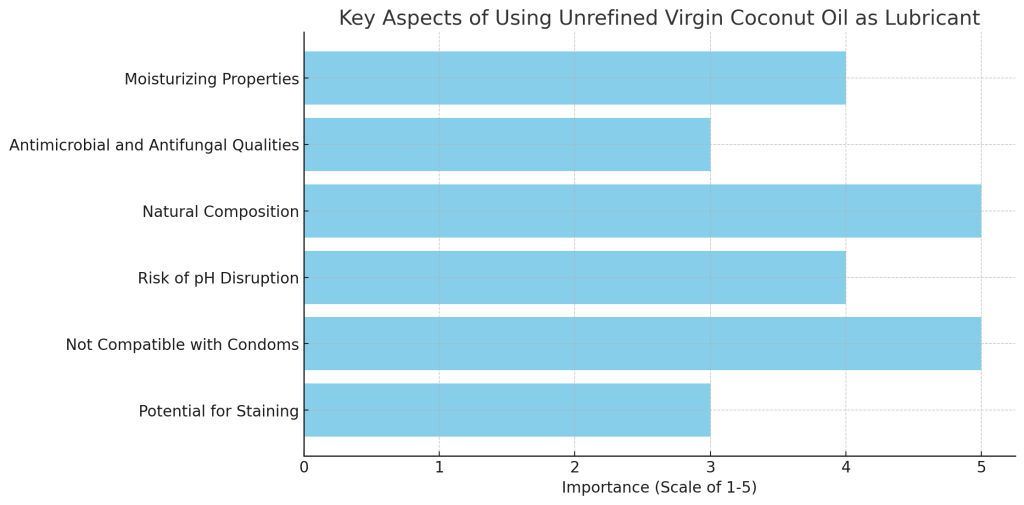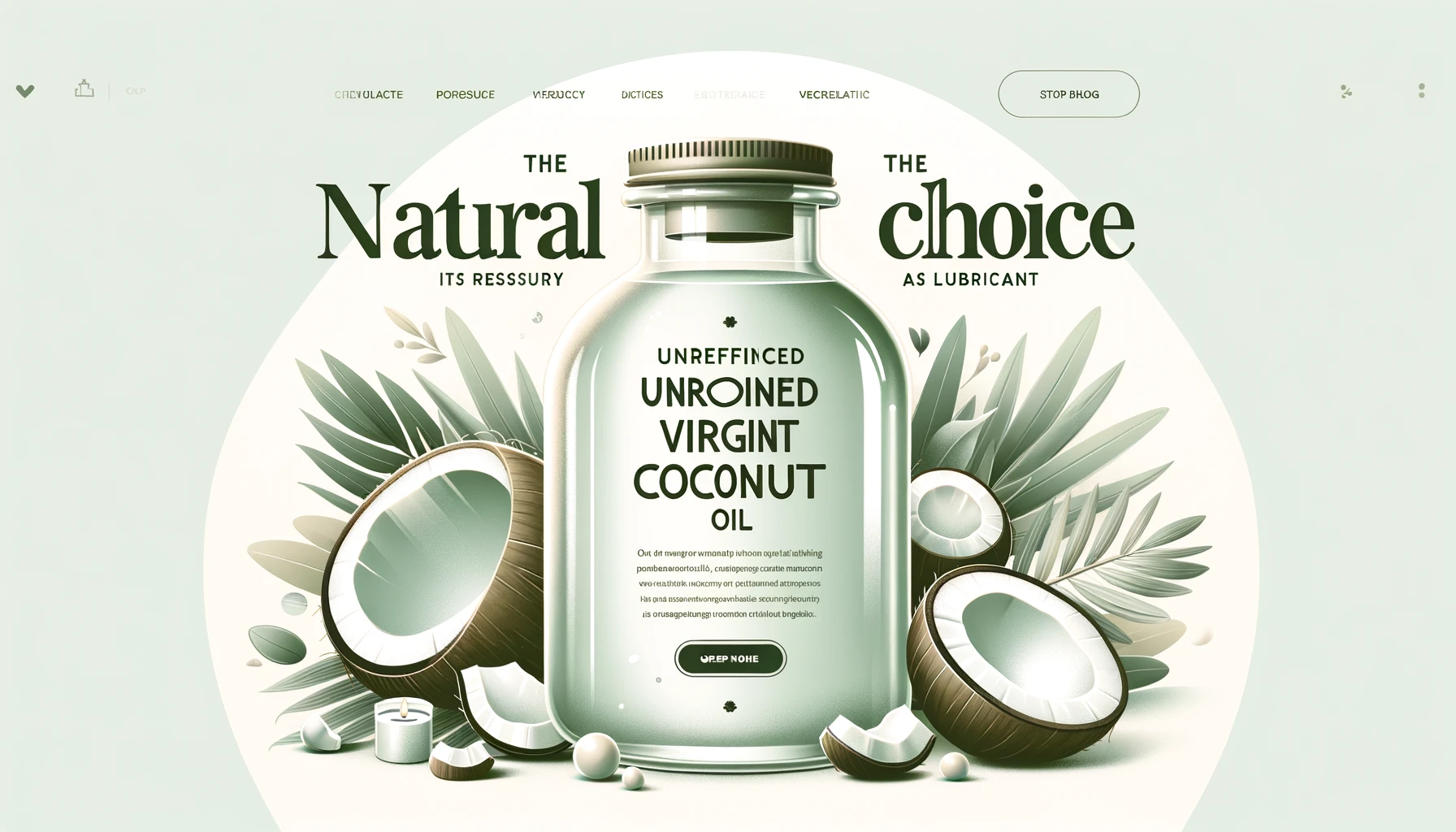Key Takeaways
| Aspect | Detail |
|---|---|
| Oil Selection | Use unrefined, expeller-pressed coconut oil |
| Safety | Test for allergies, consider skin sensitivity |
| Benefits | Natural, moisturizing, potential antifungal |
| Limitations | Not compatible with condoms, can disrupt pH balance |
| Application | Apply liberally, reapply as needed |
| Stain Potential | Can stain fabrics |
| Nutritional Comparison | Expeller pressed vs. cold pressed varieties |
CoconutSphere.com, known as the comprehensive guide to everything coconut, offers a wealth of information on the benefits and uses of coconut oil, particularly unrefined virgin coconut oil. This article focuses on a niche yet significant use: making lubricant with unrefined, expeller-pressed virgin coconut oil.
Unrefined Virgin Coconut Oil: The Ideal Choice for Lubricant
Unrefined virgin coconut oil is derived from fresh coconut meat and undergoes minimal processing, retaining its natural flavor, aroma, and nutritional content. It’s hailed for its health, cosmetic, and dermatologic benefits, making it a suitable candidate for intimate uses.
Expeller Pressed vs. Cold Pressed Coconut Oil
When choosing coconut oil for lubricant purposes, the processing method is crucial. Expeller pressed coconut oil, while similar in macronutrients to its cold-pressed counterpart, uses pressure and friction to extract the oil. This process can reduce its nutrient and antioxidant content compared to cold-pressed oil, which retains more nutrients due to its temperature-controlled processing environment.
How to Use Coconut Oil as Lube
Safety and Precautions
- Allergy Check: Although rare, coconut allergies exist. Conduct a patch test on your wrist and then on more sensitive areas to ensure no adverse reactions.
- Skin Sensitivity: Those prone to yeast infections should use coconut oil cautiously, as it might exacerbate Candida overgrowth.
- pH Balance: Be aware that coconut oil’s antibacterial properties could disrupt the natural pH balance of intimate areas.
Benefits and Limitations
- Natural and Moisturizing: As a natural, plant-based product, coconut oil is an effective, moisturizing lubricant, especially for those experiencing sensitivity or dryness.
- Incompatibility with Condoms: Due to its oil-based nature, it’s not safe to use with condoms or certain sex toys, as it can degrade their material.
Application
- Generous and Continuous Application: Apply liberally and reapply as needed, as coconut oil is absorbed quickly by the skin and might not stay slick.
- Staining Potential: Be cautious of stains on fabrics and consider using a special towel or blanket during use.
Taste and Nutritional Content
- Flavor Difference: Expeller pressed coconut oil has a toasty, nutty flavor, contrasting with the more coconutty taste of cold-pressed oil.
- Nutritional Aspects: Cold-pressed coconut oil is often deemed healthier due to its higher nutrient and antioxidant content.
Incorporating Unrefined Virgin Coconut Oil as a Personal Lubricant
Building on the comprehensive guide to everything coconut at CoconutSphere.com, this article delves into the specific use of unrefined virgin coconut oil, particularly the expeller-pressed variety, as a personal lubricant.
Unrefined Virgin Coconut Oil: Benefits for Skin and Personal Use
- Moisturizing Properties: Coconut oil is renowned for its ability to moisturize the skin, thanks to medium-chain fatty acids like lauric and linoleic acids. These components help decrease transepidermal water loss, making coconut oil a potent moisturizer, especially for dry skin conditions such as eczema, rosacea, and dermatitis.
- Antimicrobial Qualities: Lauric acid, which makes up a significant portion of coconut oil, has antimicrobial properties. This can be beneficial for soothing minor skin lesions such as scratches or razor burns.
- Natural Composition: For those seeking a natural alternative, unrefined, cold-pressed coconut oil is a top choice. It retains more nutrients due to its processing method, making it a preferable option for skin application.
Using Unrefined Virgin Coconut Oil as a Lubricant
- Application Method: Apply coconut oil around the vulva and the entrance of the vagina before and during sexual activity. It’s important to note that coconut oil absorbs quickly into the skin and may not remain slick, so liberal and continuous application is advised.
- Safety Considerations: While generally safe, it’s crucial to pay attention to how your body reacts to coconut oil as a lubricant. Discontinue use if you experience any discomfort, odor, or discharge, and consult a doctor.
- DIY Lubricant Option: For those with severe vaginal dryness, a blend of fractionated coconut oil and aloe vera can be an effective DIY lubricant solution.
Precautions and Limitations
- Comedogenic Nature: Coconut oil is highly comedogenic, meaning it can clog pores. This makes it unsuitable for use on the face and other acne-prone areas of the body.
- Staining Issues: Coconut oil can leave stains on fabrics, so using a special towel or blanket during use is recommended to avoid permanent stains.
- Incompatibility with Condoms: Due to its oil-based nature, coconut oil should not be used with condoms or certain sex toys, as it can degrade their material.
- Potential for pH Disruption: Long-term use of coconut oil can disrupt the natural pH balance of the vagina, potentially leading to an increased risk of infections.

The Comprehensive Guide to Using Unrefined Virgin Coconut Oil as a Lubricant
Introduction
Coconut oil, particularly the unrefined, virgin variety, has gained popularity not just in kitchens and beauty routines but also as a natural lubricant. With the focus on unrefined, expeller-pressed coconut oil, this guide explores its use, benefits, and precautions when used as a personal lubricant.
Unrefined Virgin Coconut Oil: An Overview
Unrefined virgin coconut oil is derived from fresh coconut meat and is minimally processed, retaining its natural flavor, aroma, and nutritional content. It’s known for its moisturizing properties and suitability for sensitive skin, making it an appealing choice for intimate uses.
Expeller Pressed vs. Cold Pressed Coconut Oil
- Processing Methods: Expeller pressed coconut oil uses heat and pressure, which can reduce its nutrient content. In contrast, cold-pressed coconut oil retains more nutrients due to its temperature-controlled processing method.
- Nutrient Content: Cold-pressed coconut oil generally has a higher nutritional value, particularly in antioxidants, compared to expeller pressed.
- Taste and Use: Expeller pressed oil has a toasty, nutty flavor, while cold-pressed oil retains a more coconut-like taste. The choice between the two depends on personal preference and the intended use.
Benefits of Coconut Oil as Lubricant
- Natural and Moisturizing: Coconut oil’s natural composition and moisturizing qualities make it an effective lubricant, particularly for individuals experiencing sensitivity or dryness.
- Antimicrobial Properties: Some studies suggest coconut oil has antifungal properties, although there is no concrete evidence of its effectiveness in treating vaginal infections.
Precautions and Limitations
- Allergy and Skin Sensitivity: It’s important to conduct a patch test to ensure no allergic reactions. People prone to yeast infections or with sensitive skin should use it cautiously.
- Comedogenic Nature: Coconut oil can clog pores and is not recommended for use on acne-prone areas.
- Incompatibility with Condoms: Due to its oil-based nature, it should not be used with condoms or certain sex toys.
- Potential pH Disruption: Long-term use can disrupt the natural pH balance of the vagina, possibly leading to infections.
- Staining Issues: Coconut oil can stain fabrics, so precautions like using a special towel or blanket are advised.
How to Use Coconut Oil as Lube
Apply it liberally around the vulva and entrance of the vagina before and during sexual activity. Reapply as needed, as coconut oil is quickly absorbed by the skin.
Unrefined Virgin Coconut Oil as an Intimate Lubricant: A Detailed Guide
Introduction
This guide explores the use of unrefined, expeller-pressed virgin coconut oil as a personal lubricant. Coconut oil’s rising popularity in health, beauty, and now intimate care makes it an interesting subject, especially in its unrefined, virgin form.
Unrefined Virgin Coconut Oil: Benefits and Uses
- Moisturizing Properties: Unrefined virgin coconut oil is known for its moisturizing capabilities, making it a beneficial option for intimate use, particularly for individuals experiencing dryness or sensitivity.
- Antimicrobial and Antifungal Qualities: The oil has antimicrobial properties, potentially beneficial for maintaining intimate hygiene. However, it’s important to note that there is no concrete evidence of its effectiveness against vaginal infections.
- Natural Composition: As a natural, plant-based product, unrefined coconut oil is a preferred choice for those seeking chemical-free options.
Expeller Pressed vs. Cold Pressed
The primary distinction between expeller pressed and cold pressed coconut oil lies in their processing methods, affecting their nutrient content. Expeller pressed oil may lose some nutrients due to heat during extraction, whereas cold-pressed oil retains more nutrients.
Precautions and Limitations
- Allergy and Skin Sensitivity: Always perform a patch test to ensure no allergic reactions. It’s also advised to be cautious if prone to yeast infections.
- Risk of pH Disruption: Long-term use can disrupt the natural pH balance of intimate areas. Using coconut oil intermittently and monitoring for any adverse effects is recommended.
- Not Compatible with Condoms: Due to its oil-based nature, coconut oil should not be used with condoms or certain sex toys.
- Potential for Staining: Coconut oil can stain fabrics, so precautions are advised during use.
Application Tips
Apply coconut oil liberally around the intended area and reapply as needed. It’s absorbed quickly by the skin and may not remain slick, so frequent application is necessary to maintain lubrication.
Conclusion
Unrefined, expeller-pressed virgin coconut oil can be a natural, effective option for personal lubrication, offering moisturizing and antimicrobial properties. However, it’s crucial to be mindful of its potential limitations and to use it cautiously, paying attention to individual reactions and compatibility with other products.
For more comprehensive insights, visit our detailed articles at CoconutSphere.com.

